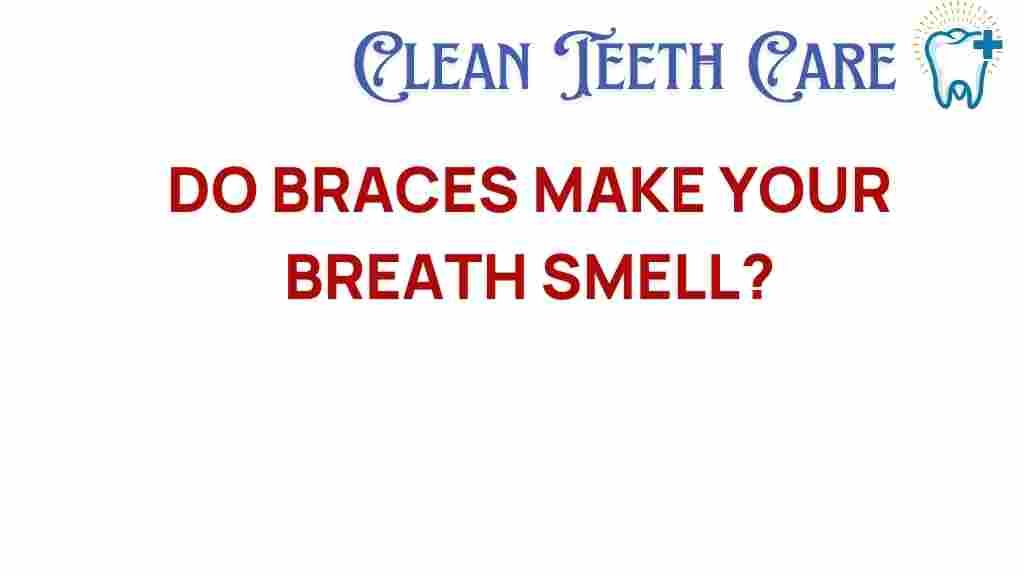Do Braces Contribute to Bad Breath?
Braces are a common orthodontic treatment designed to align teeth and improve oral health. However, many people wonder if wearing braces can contribute to bad breath. In this article, we will explore the relationship between braces and bad breath, focusing on the importance of oral hygiene, the role of food particles and plaque, and how to maintain fresh breath during your orthodontic journey.
Understanding Bad Breath
Bad breath, or halitosis, is a common issue that can arise from various factors, including poor oral hygiene, certain foods, and medical conditions. When it comes to braces, the potential for bad breath increases due to the challenges of keeping teeth and gums clean with braces in place.
How Braces Affect Oral Hygiene
Braces consist of metal brackets and wires that can trap food particles and plaque, making it more challenging to maintain oral hygiene. Here’s how braces can contribute to bad breath:
- Trapped Food Particles: Food can easily get stuck in the brackets and wires of braces, leading to bacteria growth and potential bad breath.
- Increased Plaque Buildup: The presence of braces can make it difficult to brush and floss effectively, leading to plaque buildup, which is a major contributor to bad breath.
- Gum Health: Poor hygiene can lead to gum inflammation and disease, which can also cause bad breath.
Maintaining Oral Hygiene with Braces
To combat bad breath while wearing braces, it is essential to establish a robust dental care routine. Here are some steps to follow:
1. Regular Brushing
Brush your teeth at least twice a day, preferably after each meal. Use a soft-bristled toothbrush and fluoride toothpaste. When brushing with braces:
- Angle your toothbrush to clean around the brackets.
- Brush along the gum line to remove plaque.
- Consider using an electric toothbrush for better plaque removal.
2. Flossing Techniques
Flossing can be more challenging with braces, but it’s crucial for removing food particles and plaque:
- Use a floss threader or orthodontic floss to help maneuver around the brackets.
- Floss at least once a day to keep your gums and teeth healthy.
3. Rinse with Mouthwash
Incorporating mouthwash into your routine can help eliminate bacteria and freshen your breath:
- Choose an antibacterial mouthwash to target bad breath.
- Rinse daily to maintain fresh breath and reduce plaque.
4. Regular Dental Visits
Visiting your orthodontist and dentist regularly is essential while wearing braces. They can:
- Check for plaque buildup and suggest professional cleanings.
- Monitor your progress and address any issues promptly.
Foods to Avoid with Braces
Some foods can exacerbate bad breath or complicate oral hygiene when you have braces. Here are some foods to limit or avoid:
- Sticky Foods: Caramel, taffy, and other sticky candies can cling to braces and promote plaque formation.
- Hard Foods: Nuts and hard candies can damage brackets and create sharp edges that trap food.
- Strong Smelling Foods: Garlic, onions, and certain spices can contribute to bad breath.
Hydration is Key
Staying hydrated is essential for maintaining fresh breath. Water helps wash away food particles and bacteria. Make sure to drink plenty of water throughout the day.
Troubleshooting Bad Breath with Braces
If you notice persistent bad breath despite maintaining good oral hygiene, consider the following troubleshooting tips:
1. Check for Food Traps
Inspect your braces regularly for trapped food particles. Use a mirror to check for any debris lodged in the brackets or wires.
2. Evaluate Your Oral Hygiene Routine
If you’re still experiencing bad breath, reassess your dental care routine:
- Are you brushing long enough? Aim for at least two minutes.
- Are you using the right techniques? Consider asking your orthodontist for tips.
3. Consider Your Diet
Evaluate your diet for potential culprits. Are you consuming a lot of sugary or acidic foods that could contribute to plaque buildup?
4. Consult a Professional
If bad breath persists, it may be necessary to consult your orthodontist or dentist. They can check for underlying issues such as gum disease or tooth decay.
Conclusion
In conclusion, braces do not directly cause bad breath, but they can make maintaining oral hygiene more challenging. By following a diligent dental care routine, including regular brushing, flossing, rinsing with mouthwash, and avoiding certain foods, you can minimize bad breath while undergoing orthodontic treatment. Remember, regular visits to your orthodontist and dentist are crucial in keeping your smile healthy and fresh.
For more information on orthodontics and maintaining fresh breath, check out this helpful resource: Dental Care and Braces.
If you have any additional questions or concerns about braces and bad breath, feel free to reach out to your orthodontic specialist or visit this page for more tips.
This article is in the category Hygiene and created by CleanTeethCare Team
